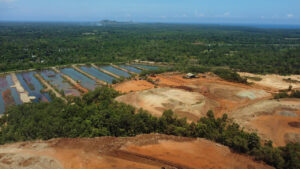By Kenneth Christiane L. Basilio, Reporter
SENATORS and congressmen have agreed not to ban ore exports under a new fiscal regime for large-scale miners that seeks to raise the share of the government in mineral revenue.
A bicameral conference committee from the Senate and House of Representatives reconciled disagreeing provisions of their bills on Wednesday, after almost a decade of legislative delays.
As of press time, the Senate had ratified the bicameral conference committee report, with only Senator Risa N. Hontiveros-Baraquel voting against it.
The House also ratified the report, which will now be sent to Malacañang for the President’s signature.
“This bill has been pending for the past three Congresses,” Albay Rep. Jose Ma. Clemente S. Salceda, who heads the House Ways and Means Committee, said in a statement. “Today, it finally makes it to the President’s desk.”
The Philippines is seeking to streamline its mining fiscal regime for large-scale miners to secure a larger share of industry profits. Tax obligations for miners currently vary depending on their agreements with the government.
The proposed law seeks to charge large-scale miners operating within mineral reservations 5% of their gross output, and sets a five-tier margin-based royalty system ranging from 1% to 5% for those operating outside, according to a copy of the reconciled version obtained by BusinessWorld.
A five-tier windfall profits tax system ranging from 1% to 10% was also included in the bill.
“While a tax increase is inevitable, we believe this progressive and responsive approach allows the government to benefit more when global commodity prices rise, without placing undue burden on miners during market downturns,” Michael T. Toledo, chairman of Chamber of Mines of the Philippines, said in a Viber message.
The measure also proposes the “ring-fencing” of large-scale miners, which would treat miners as a separate taxable entity based on each extracting agreement it holds with the government.
The Southeast Asian nation holds an estimated $1 trillion in ore reserves and is among the world’s largest nickel suppliers to top metals consumers China and Japan, as limited smelting capacity due to high power costs and infrastructure constraints keeps the country reliant on ore exportation.
About $7.37 billion worth of ores were exported last year, according to the Environment department’s Mines and Geosciences Bureau.
A copy of the reconciled version showed the removal of the Senate-proposed provision on the ban on the export of raw ore.
The Senate version included a five-year grace period before imposing a ban on unprocessed minerals to give time for miners to set up processing plants in the country.
Mr. Salceda said there was no formal study on the implementation of the ore export ban.
“You can’t just say that we’ll put a five-year delay for the setting up of domestic ore processing facilities. What if it takes 10 years?” he said.
Mr. Toledo welcomed the decision by lawmakers to remove the proposed ban on ore exports.
“This is a strategic step towards revitalizing the Philippine mining industry,” he said.
The Philippine Nickel Industry Association said the decision was “a prudent and forward-looking step that protects jobs, upholds investor confidence, and reflects a more realistic understanding of the challenges surrounding domestic mineral processing.”
However, Mr. Salceda said the bicameral conference committee decided that the proposed ban on ore exports should be up to the next Congress.
VALUE OF MINERALS“The most meaningful part of this reform is not the tax rate. It is the state’s ability to finally see and value what is being taken from our soil,” said Mr. Salceda.
Under the proposed law, the bureaus of Internal Revenue and Customs are mandated to audit the sales and exportation of minerals, with expanded authority to review mining documents, including marketing documents and assay reports.
It also mandates the establishment of laboratories and purchase of advanced mineral analysis tools to help determine the quality of raw ores originating from mines.
“The government will also be able to make use of metal pricing databases and other global benchmarks to assess whether declared prices reflect true arm’s length values,” Mr. Salceda said.
The measure would provide a “fairer and more sustainable” source of government revenues and would encourage foreign investments into the industry, Mr. Toledo said. The government could earn up to P5 billion yearly from the measure, according to Mr. Salceda.
Meanwhile, Alfred Benjamin R. Garcia, research head at AP Securities, Inc., said the government should look at lowering electricity costs and providing tax breaks to mining companies to encourage them to set up domestic mineral processing facilities instead of banning ore exports.
“It’s unnecessarily burdensome to force the industry to invest in processing and refining,” he said in a Viber message.
Having a transparent fiscal regime for the mining industry would make the country more attractive to foreign investors, John Paolo R. Rivera, a senior research fellow at the Philippine Institute for Development Studies, said.
“Clarity on taxes reduces regulatory uncertainty, which has historically been a key deterrent,” he said in a Viber message.
The government should look at crafting a mineral development plan and establish a long-term industrialization plan for the mining sector to further attract investments into the domestic industry, he added.






